- Colection of 65 PHP scripts for $4.29 each
Welcome to another episode of “programming languages compete against each other”. This time we are pitting two of the most popular back-end languages against each other: it’s time for PHP vs Python.
In the following article, we will take a deep dive into the two languages. We will introduce them both on their own, their main features, what you can use them for, and which one is easier to learn. After that, we will compare PHP vs Python in terms of performance, usage in web development, popularity, and career opportunities.
Let’s go!
(By the way, we have a similar comparison of JavaScript vs PHP, so be sure to check that out as well.)
PHP vs Python: Differences and Similarities
Before we go off to compare the two programming languages, let’s first understand what they are. The first thing we need to mention is that, in some regards, PHP and Python are quite similar (which is why people compare them a lot). Both languages are:
- Open source – PHP and Python are free to download and use as you will. Their source code is publicly available and they are supported and constantly improved by large developer communities.
- Back-end focused – Both languages are made for back-end development, meaning running on a web server and creating the big-picture structure. They are not for controlling the user interface or front end like JavaScript or CSS.
- High level – That means they are made for human understanding as opposed to machine processing.
- Interpreted – This is opposed to compiled. Both PHP and Python are translated into machine-readable code while being processed – instead of beforehand.
- Object-oriented – Both languages know objects and classes, pieces of data with unique attributes and behavior. Their focus is also on manipulating elements rather than the logic behind the manipulation.
- Cross-platform – This means they work in different environments and platforms, e.g. Windows, macOS, and Linux.
Aside from that, there are also some stark differences between PHP and Python, so let’s dive a little deeper into each.
What is PHP?
PHP stands for “Hypertext Preprocessor”. The acronym originally comes from “Personal Home Page Tools”. This is what developer Rasmus Lerdorf called some scripts he used on his own website back in 1994 and which formed the basis for PHP.
The first official version of PHP came out in 1995. After many years of further development, we are currently on PHP 8.1, which came out in November 2020.
The programming language is known for its accessible syntax, great database support, and universality. It runs on almost all operating systems (Windows, macOS, Linux, and Unix), types of devices (desktop, mobile devices), and servers (IIS, Apache, NGINX, and more).
Well-known users include Facebook, Slack, and Tumblr. In addition, PHP powers a number of content management systems (CMSs) including WordPress, which runs more than 40% of the Internet at this point.
Applications of PHP
PHP is a server-side scripting language. It can generate dynamic page content in HTML, add, modify, and delete data as well as open, write, read, close, and delete files on a web server. In addition, it has capabilities such as evaluating form data, sending and receiving cookies, controlling user access, processing secure transactions, and more.
Because of these capabilities, it’s most commonly used for building web pages and applications. While it’s suitable for other purposes, this is what PHP excels at. That’s also why it often serves as the main technology of content management systems. Besides WordPress, there are Joomla and Drupal. Plus, in the ecommerce sector, you have Magento, PrestaShop, OpenCart, and more.
PHP is also capable of things like graphic design and image processing. For example, it can rotate, resize, crop, and otherwise manipulate a great number of image formats. It’s also able to power desktop apps, create charts, and more. However, its principal domain is powering web presences.
What is Python?
Developed by Guido van Rossum, Python was first released in 1991. It has been diligently updated since then with the most current version being Python 3.10, released in October 2021.
As you will see below, Python is one of the fastest-growing programming languages in terms of popularity. It can also boast some famous users including Instagram, Spotify, Netflix, and Pinterest.
However, in contrast to PHP, it’s more of a general-purpose language and less focused on web development. It’s suitable for small and large-scale projects, application development, and rapid prototyping. It also has many features that make it easy to hit the ground running.
As we will see below, one of the main features of Python is its ease of use and beginner-friendliness. It’s also highly extendable and powerful.
Applications for Python
What can you use Python for?
For one, the language is popular in web development. It powers frameworks and CMSs like Django, Bottle, Flask, Django CMS, and Plone. It also comes with modules and libraries for standard tasks like content management and working with a database. In addition, it supports protocols like HTTP, FTP, IMAP, POP, and more.
Aside from that, Python is one of the most popular languages in data science and analysis, machine learning, and artificial intelligence. It also has a lot of modules for these applications like SciPy, Seaborn, Pandas, IPython, and TensorFlow.
Finally, since it is OS-agnostic, you can employ the language to create graphical user interfaces and use it in software development. For example, the Spotify desktop app is Python-based. There are even games written with it.
In short, Python is flexible, powerful, and widely capable.
All clear so far? Then let’s start comparing PHP and Python to see which is the right language for you.
Is Python or PHP Easier?
The first thing we want to talk about is the ease of learning either language. After all, you might be here because you are asking yourself which one is more worth learning in 2022 – PHP or Python.
Syntax Comparison
Let’s start with PHP. It possesses an easy syntax and common programming concepts: functions, if conditions, while and for loops. Its variable names are case-sensitive and prefaced by $, statements are concluded by a semicolon, it uses curly braces and the -> operator.
PHP is also weakly typed, so you don’t have to define the data type for variables. You can simply give them a value and PHP figures out the rest by itself.
In addition, the language is quite easy to install and run in different operating systems. Plus, there’s a lot of cheap hosting where you can find it pre-installed.
Yet, if PHP is beginner-friendly, Python is on a whole other level. One of its main features is readability – the formatting, simple syntax, and use of proper English words are all geared towards that.
In addition, there are no curly braces, the language uses indentation instead. Python also rarely uses semicolons and there are fewer special cases and exceptions. This creates an easy-to-understand visual structure and makes Python code shorter.
As a consequence, it’s easier to read, learn, and debug. Plus, the syntax leaves more room for mistakes because it breaks less easily. In fact, online programming courses often use Python as their example for teaching programming basics.
While the language is dynamically/strongly typed, which means it’s more restrictive about mixing types, it’s still trying to not be too rigid. What’s true though, is that Python is harder to install on both Windows and macOS. Updating it is also more complicated.
Despite that, in terms of its learning curve, Python is ahead of PHP.
Documentation
No matter if you are a beginner or seasoned developer, sooner or later you will need to read up on some stuff. Because of that, your programming language of choice best be well documented.
The good news is that both our contenders fare well in this area. Each has its own official knowledge base and there are countless forums, articles, tutorials, and online courses available for both of them.
Despite that, Python’s documentation is a bit better. One of the main reasons is that the PHP documentation offers the ability to leave comments, which developers do to provide examples, clarify concepts, etc.
However, the comments are not moderated or updated, which is why you can encounter information that is no longer up to date. This can be confusing even if the documentation is thorough and excellent aside from that.
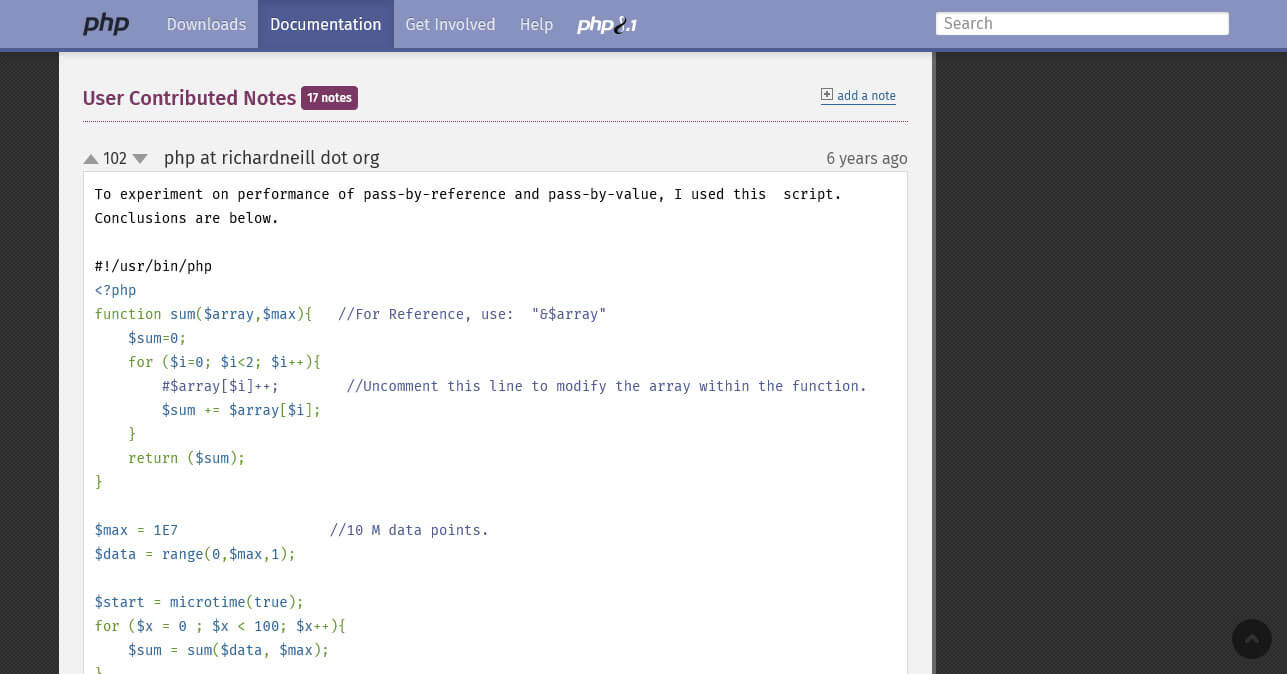
The Python knowledge base doesn’t have this issue. It is also divided by version, offers a table of contents, tutorials, FAQs, and more. So, it’s slightly better overall.
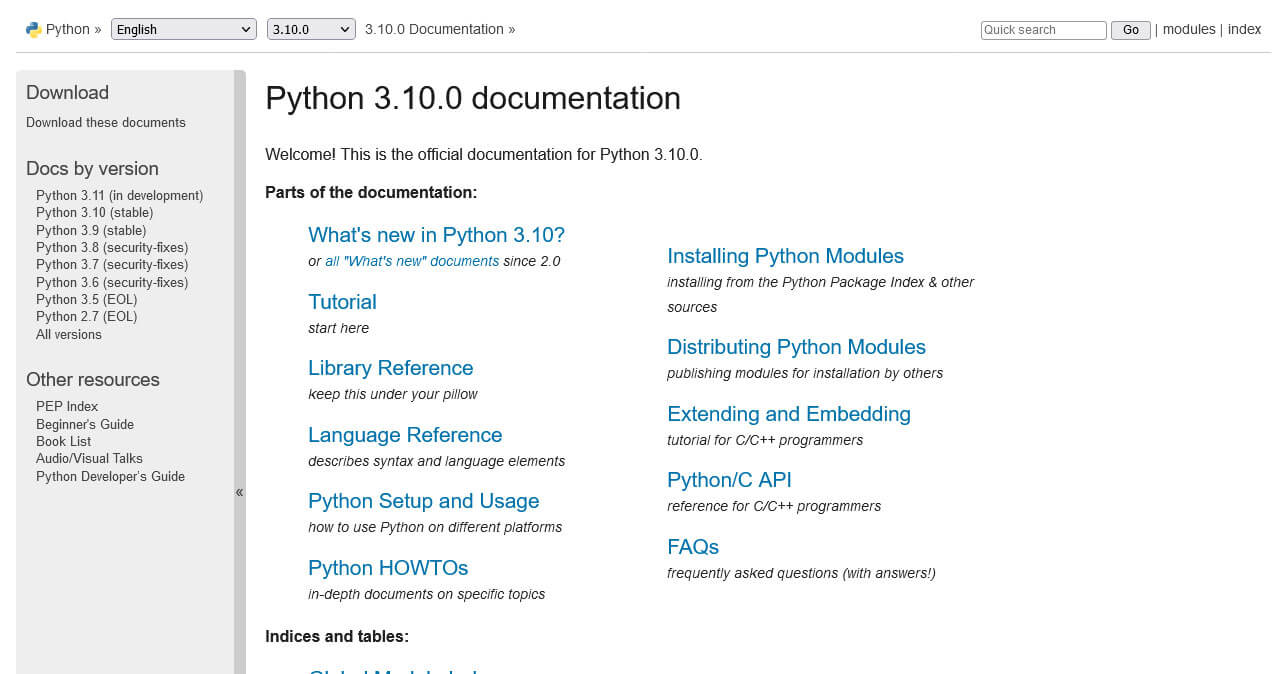
Community and Support
Having a community and support architecture is just as important as documentation. It’s often not enough to look over a technical manual, you also need real-life human beings to answer your questions sometimes.
Here, too, both our programming languages are in a good position thanks to their decades of development. As mentioned above, there are lots of third-party websites that you can go to for finding help and they each have a large group of users that you can reach out to on forums.
In addition, since they are open source, PHP and Python have active developer communities behind them that continually strive to make them better. In short, you will rarely run into trouble with nowhere to turn to.
So, which is easier, PHP or Python?
Taking everything together, Python is a bit more beginner-friendly. Readability is one of its main features and it has slightly better documentation, so freshman developers might want to go towards that.
PHP vs Python: Performance
Speed is a crucial topic, especially in web development. It influences the user experience, returns, and SEO – in short, the overall success of a website or web application.
Here, both programming languages are somewhat on an even footing. While Python used to be much faster in the past (because PHP was very slow), this is no longer the case. PHP 7 saw some great improvements in terms of speed, making it twice as fast as previous versions and faster than many other programming languages, including Python. On the other hand, Python’s code compilation process is very quick as well.
As a consequence, when building a simple application, it doesn’t make much of a difference if you are using either PHP or Python. Only when dealing with large systems with great amounts of traffic that need to load quickly does PHP have an edge over its competitor.
In short, on paper PHP is faster than Python, however, your project needs to reach a certain size for it to make a big difference.
PHP vs Python: Which One Should You Use for Web Development?
Both languages are popular tools for creating websites and web applications. However, which one is more suitable for web development, PHP or Python?
Web Frameworks and CMSs
Both contenders offer options for web frameworks. Frameworks are very helpful during development because of their libraries and other shortcuts that make creating websites and applications faster and easier.
For PHP frameworks, you have a number of options: Laravel, the Laminas Project (previously called Zend), CodeIgniter, Symfony, Yii, and more. They form the basis for many apps and well-known websites. In addition, PHP powers a number of popular CMSs. If you know the language, you can easily get started building websites, themes, and plugins with them and for them.
Python is also no slouch in this area. Developers can choose among Django, TurboGears, Dash, CubicWeb, Flask, and Falcon – to name just a few options. Django is a particularly popular choice for clean and rapid development. It’s described as “a web framework for perfectionists with deadlines” and is the go-to Python framework for many users.
Overall, the two competitors tie in this area, though Python is becoming more and more popular. Especially Django has seen a huge spike in popularity in recent years.
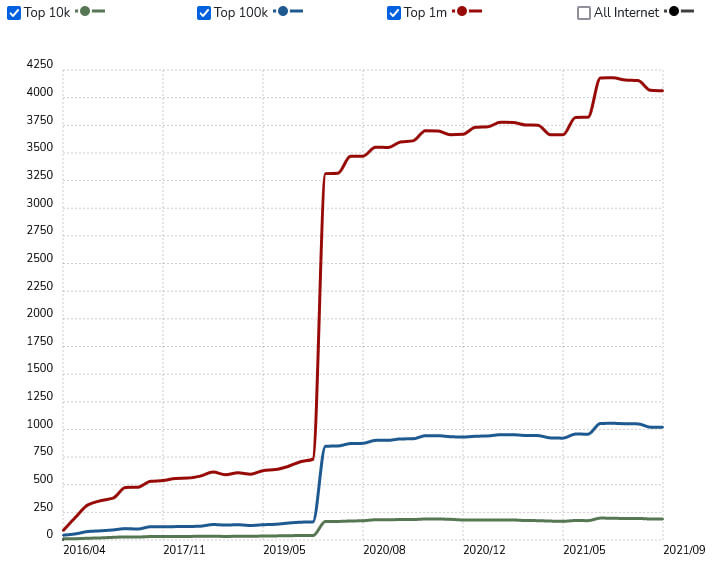
Database Connectivity
Particularly when building a blog or online shop, the ability to connect your website or application to a database is crucial – it lets you store and access large amounts of information.
PHP is known to be great in this area. It runs on the LAMP stack (Linux, Apache, MySQL, PHP) so it pairs well with MySQL out of the box. However, it also works with a load of other database systems (e.g. MariaDB, PostgreSQL, Oracle). What’s more, it’s easy to connect PHP to a database because that’s part of PHP’s core functionality. This makes the language perfect for database-intensive applications.
On the other hand, Python is not so great here. While it does work with MySQL, it’s more complicated to set it up. You need extra drivers to establish the connection and the process takes more effort. In addition, Python is not as compatible with other database systems either.
So, for this one, PHP pretty clearly takes the cake.
Library Management
Libraries make development quicker and easier and, as a consequence, cheaper. Therefore, library management is crucial when choosing which language to use. Good functionality in this area allows you to easily find, load, install, and also remove whatever extensions you need for your purpose.
PHP is not that strong in this regard. In terms of library management tools, there’s Composer, a relatively recent addition. More specifically, it’s a dependency manager that takes care of installing and updating libraries for you. Then there’s Packagist – the main repository for Composer, which makes packages and libraries publicly available and installable. Though relatively new, Packagist has counted for hundreds of millions of downloads. Plus, it has libraries directly meant for web development. Yet, overall, library management is not an absolute strong suit of PHP.
Python, in contrast, really shines when it comes to managing libraries. Its package-management system Pip is directly connected to the Python Package Index (PyPI).
The directory has libraries for many different topics including debugging, machine-learning, natural language processing, image processing, and more. They also integrate seamlessly and are easy to install and use.
However, because Python is more of a general-purpose programming language, there are fewer library options specifically for web development. Yet, despite that caveat, Python wins in this regard because its library management is so much better.
Flexibility and Scalability
Adaptability and the capacity to scale are two important hallmarks of programming languages. Your website or app must be able to support a growing user base and demand, allow you to scale up and down, and extend your project based on need.
PHP is very scalable. The biggest testament to that is Wikipedia, which runs on it. Plus, with companies like Facebook choosing to use the programming language, there’s likely nothing for you to worry about.
The same goes for Python, which has also proven itself as the technology powering a few of the most popular websites and social networks. Yet, it also has a slight edge in terms of flexibility. That’s mostly due to the number of frameworks and its library support. With Python, you can use decoupled components that you can replace and unplug as the need arises.
In comparison, PHP is a little less flexible, which is why we have to give the points to Python.
Security
Cybersecurity is an essential concern for any web project. Anything publicly accessible on the Internet faces a number of possible threats. For that reason, you have to make sure the technology you use is safe and secure.
Generally, as back-end languages, both PHP and Python offer a good level of security. All code is executed on the server so it’s harder to inject malicious code in contrast to, say, JavaScript.
PHP also has a lot of security-related features. It can do cookie and session handling, authenticate usernames and passwords, do two-factor authentication, and it has built-in features for data sanitization.
Python, too, puts a lot of emphasis on data safety. Django, its most popular web framework, has built-in security features. Python is also the language of choice for many government and banking websites (including, allegedly, the CIA).
So, is it a tie?
Well, a study that looked at vulnerabilities in programming languages over time places Python clearly ahead of PHP.
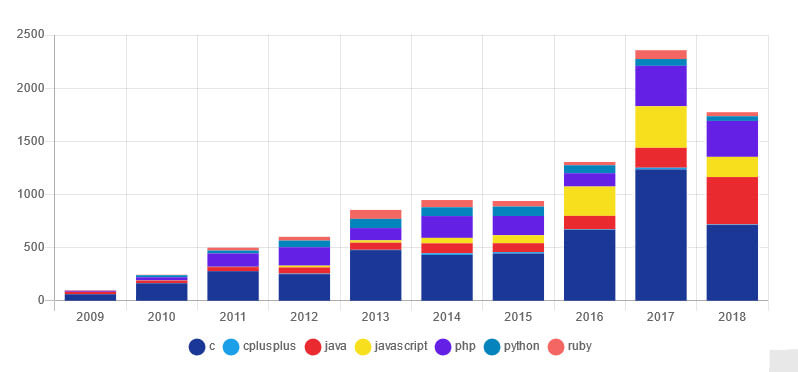
On the other hand, no programming language is necessarily inherently more or less secure. It depends a lot on the skill and knowledge of the developers to create a secure app or website. When that is given, which language you are using is a less central concern.
Yet, the general perception is that Python is the more secure one, so we are giving it to them.
So, Which One Should You Choose for Web Development?
Both programming languages are suitable for creating websites and applications. Which one is right for you depends a bit on what you are trying to do.
Let’s quickly recap the results from above. The two contenders are pretty even in terms of CMSs and frameworks even if PHP is a bit more established. PHP also wins in playing nice with databases while Python is ahead in library management and support. Both languages scale equally well though Python is a bit more flexible. Finally, at least on paper, Python appears more secure.
So, which one should you pick for your web development projects?
Developing for the web is PHP’s core ability. It’s great for outputting dynamic content and working with a database, such as in the form of a CMS or ecommerce website. It’s also suitable for less complex, small to medium-sized applications.
Python, on the other hand, is better suited for larger, more complex projects, especially when they have to do with machine learning, AI, data science, or similar. That’s simply one of the strong suits of the programming language.
So, in the end it depends, as it often does. Both programming languages offer advantages and disadvantages that make them more or less suitable for different kinds of web projects. Yet, it’s good to be aware of the strengths and weaknesses of each so you can choose the right fit for your particular needs.
PHP vs Python: Career Opportunities and Salary Expectations
The last thing we want to deal with when comparing PHP vs Python is which one it makes most sense to learn from a career standpoint. After all, if you want to improve your skill set as a developer and learn a new programming language, it’s a great idea to move in the direction where the money is.
Language Popularity
Let’s first look at popularity. Here, when you look at pure usage, PHP is way ahead. According to W3techs, it is the server-side language of 78.2% of all sites where the technology is known, while Python’s share is only 1.4%.
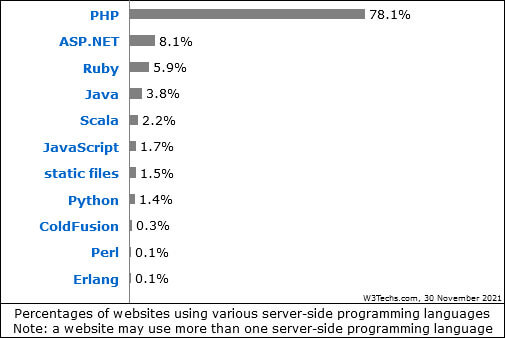
However, that does not paint a completely accurate picture. When looking at the trend over time, you can see that it has started losing popularity.
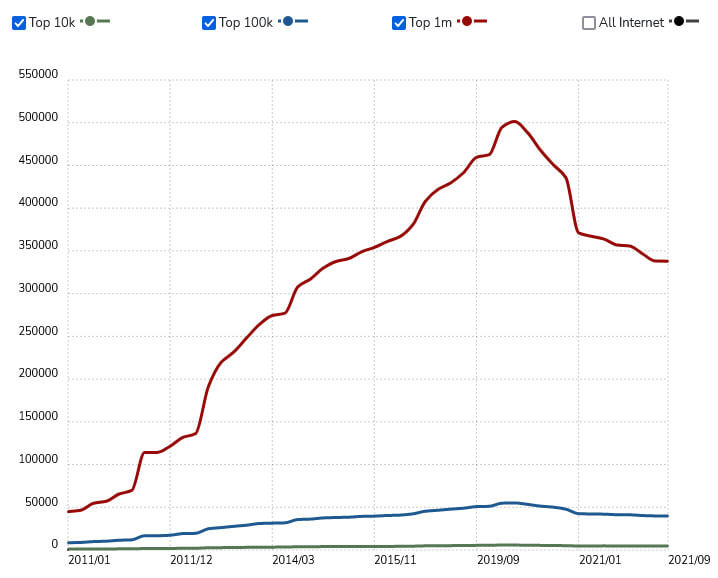
At the same time, Python has seen a huge uptick in usage, at least among the most popular websites.
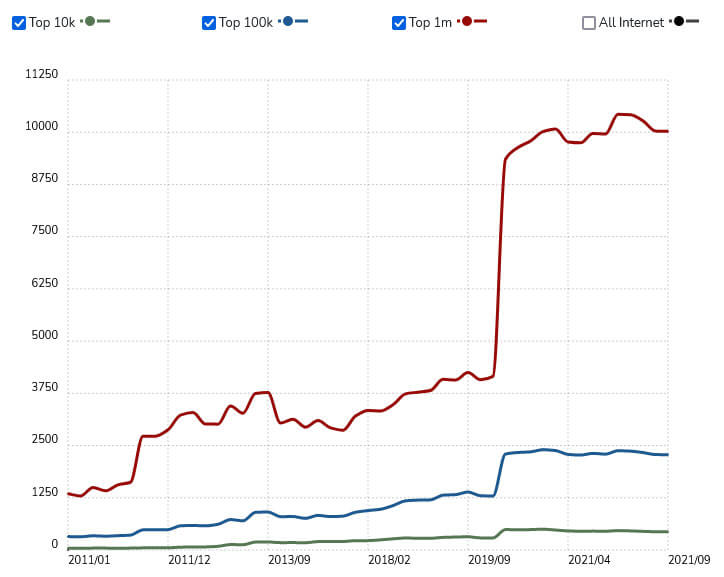
You can also see this in the search interest over time, where Python has surpassed PHP since 2016.
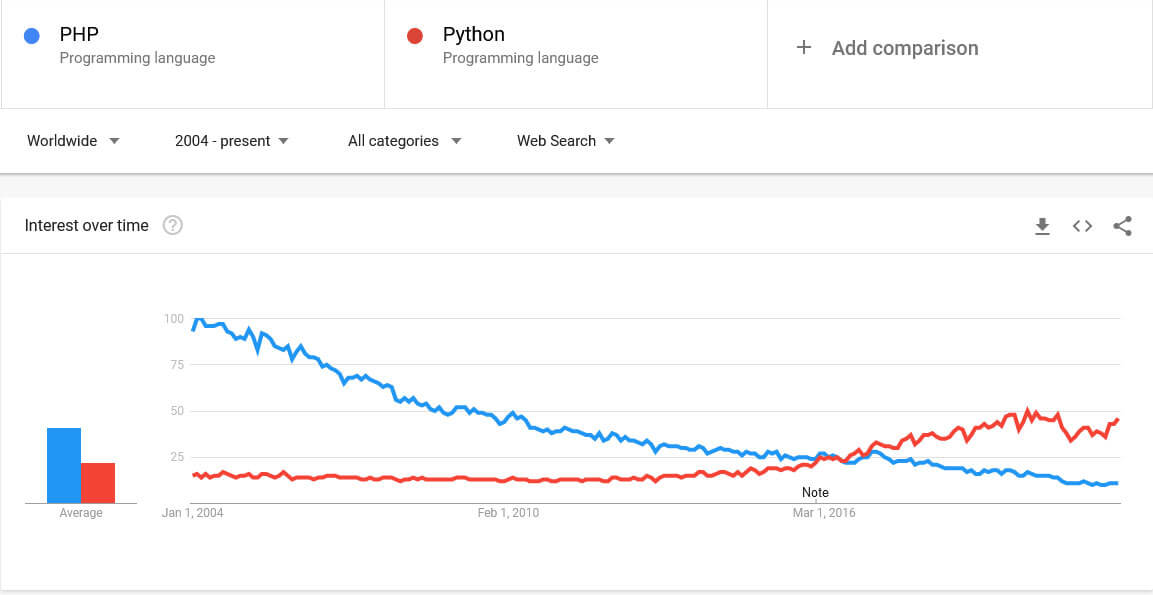
In addition, in the Stack Overflow Developer Survey 2021, Python constantly scores as one of the languages developers most want to work with.
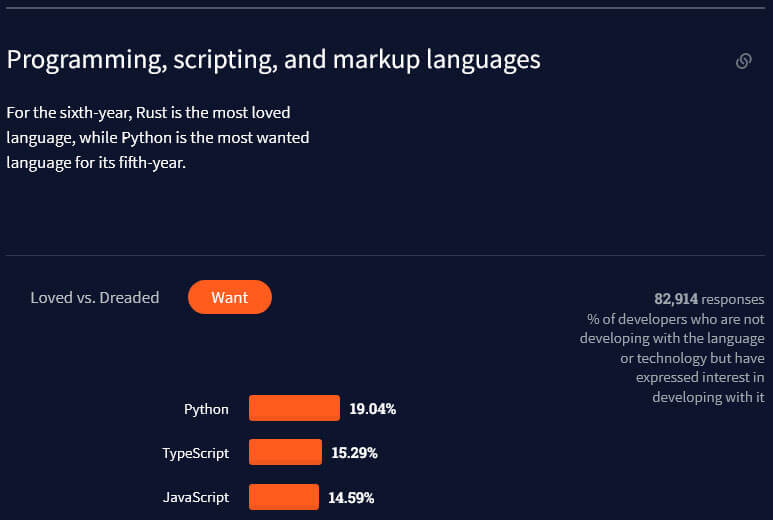
So, while PHP is resting comfortably on its laurels, Python is quickly making headway.
Developer Salaries
A similar picture emerges when looking at payment opportunities. If you compare the average salaries for PHP and Python developers on indeed.com, those who focus on PHP earn on average $92,237. Their Python counterparts,however, can expect about $17,000 more, with $109,283 being the average.
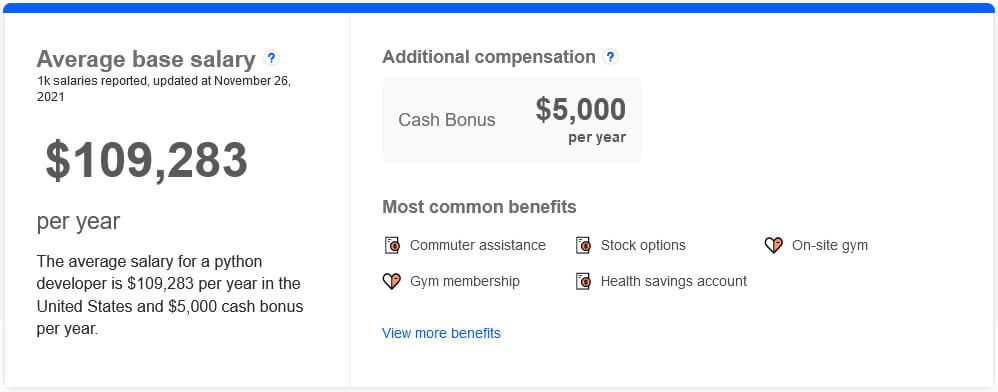
The difference is even more pronounced on Glassdoor. Here, the average salary of a PHP developer is $79,499/year, while Python programmers command $96,890.
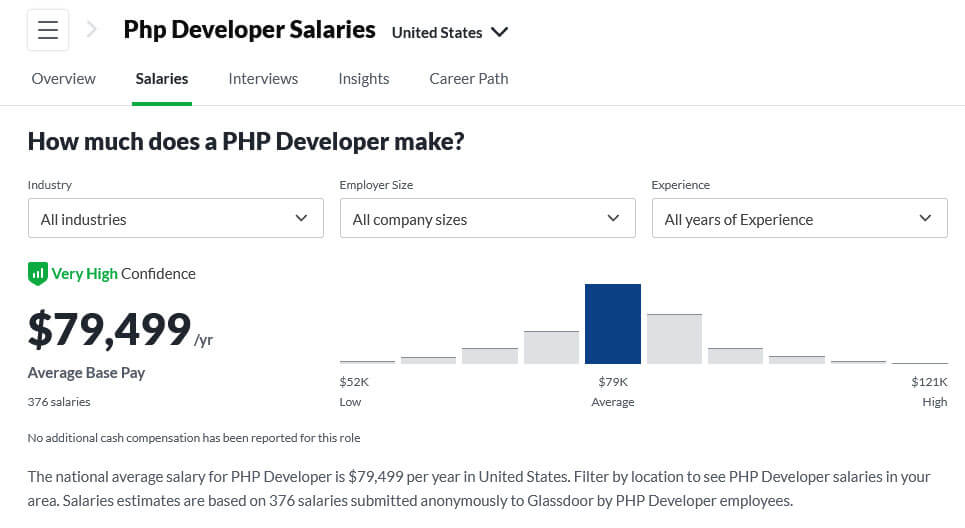
The difference in salary is also reflected in demand. When you search for US job openings containing the word “PHP” on LinkedIn, you’ll find a bit more than 60,000. In contrast to that, more than 700,000 openings exist for the keyword “Python”.
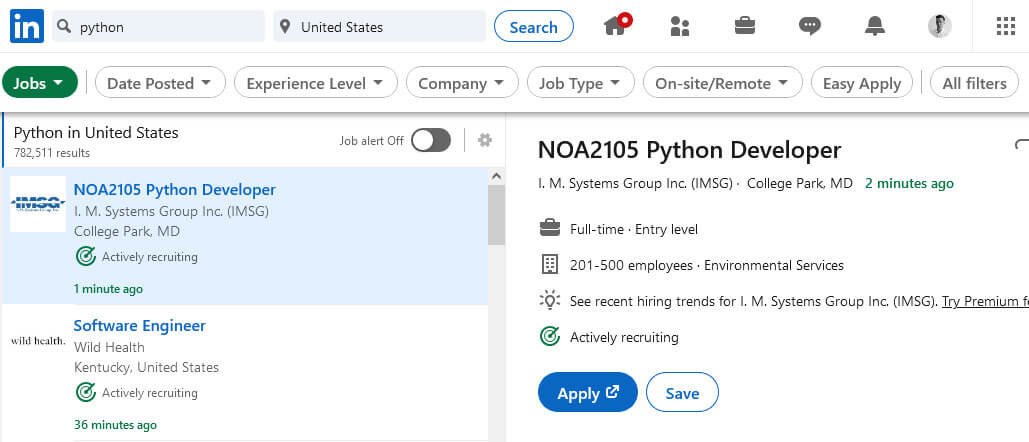
So, if you are a developer and want to change jobs or command higher pay, learning Python is definitely something you should consider.
Should You Learn Python or PHP in 2022?
If you look at the above, you’ll see that Python is ahead in several areas: ease of learning, library support, flexibility, popularity, and not to mention, career opportunities.
So, does that mean you should always choose it over PHP?
Not so, especially since PHP is faster, more established, has great community support, and is part of some of the most popular software in the world.
In the end, both contenders offer pros and cons. PHP has been the choice for web development for a long time, and for good reason. It’s something that it does well and where it offers lots of useful features. However, Python is making headway and offers its own advantages, here and in other areas.
In the end, it comes down to your wants, needs, and skill level. Either language will serve you well when creating basic websites or web apps. For more complex needs, especially when it involves machine learning or artificial intelligence, Python is the better choice. Yet, if you need something database-intensive like an online shop, PHP is often the way to go. So, make your choice according to that.
The only thing we can say for sure is that, as a beginner, you might be well advised to start off with Python. The language is more newbie-friendly and also offers better employment opportunities down the line.
What are your thoughts on PHP vs Python? Anything to add to the above? Let us know in the comments below.